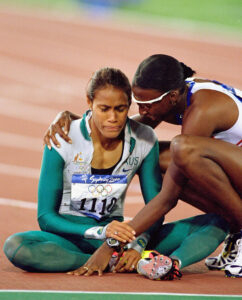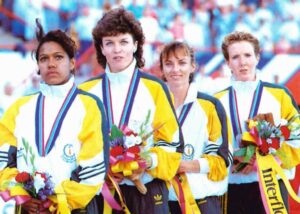Here is the second in my selection of the most important photographs in Australian sporting history. The images are not ranked or presented in any particular order. Ranking is a subjective notion that I don’t want to buy into.
Each image presents a frozen moment in time that has historical significance in the Australian world of sport. Even more importantly, each image opens the door to a back story that resonates deeply within Australian culture, consciousness and society. In other words, the photos have more guts than they may appear to have on the surface. With some images, you will have a good idea of what is going on in the shot and may have some understanding of the back story. With others, the importance of the image and story may be a complete surprise.
For those of us who were around at the time, this photograph of Cathy Freeman, (draped in the Australian and Indigenous flags after winning the 400m gold medal at the 2000 Summer Olympics), reminds us of one of the most exciting moments in Australian sporting history. Freeman was our hero! Freeman was our angel!

For those Australians who were not yet born, or were too young to remember, the images of Freeman’s victory and ensuing celebration may still be familiar. The excitement of the moment and the nation’s pride at her success have become part of the Australian story and passed down from generation to generation.
Perfect representative
The 400m final was not Freeman’s first role at the Games. Ten days had passed since she, before an enthralled audience of over one hundred thousand attendees at the Games Opening Ceremony, (not to mention many more hundreds of millions watching on television), had performed the most important ritual of the event… the lighting of the cauldron with the eternal Olympic Flame.
While the selection of who was to light the cauldron was not revealed until the last moment in the ceremony, Freeman, as a young, female, indigenous, world champion athlete was almost every Australian’s idea of who would be perfect to represent the ideals, values and purposes of the Sydney 2000 Games. Of course, Freeman carried out her role with grace and aplomb. That was the easy bit. Now, in ten days’ time, she had to back it up by beating the fastest 400m runners in the world and, thus, give her adoring Australian fans an expected gold medal.
Win the gold medal she did… and Australia and the world celebrated. That is the obvious story behind the image. The deeper story is a much more complex one and goes to the heart of Australia’s evolving culture and its relationship with its original inhabitants.
Freeman, of Kuku Yalanji and Birri Gubba decent, was born in Slade Point, Mackay in 1976. After a promising junior athletics career she came into the sporting public’s eyeline when she became the first indigenous Australian to win a Commonwealth Games gold medal. She, and her sprinting teammates, won the 4 x 100 relay event at the 1990 Commonwealth Games in Auckland. She was only sixteen years old!
Striking emblem!
Four years later, as an emerging world talent, she was selected to represent Australia in the individual 200m and 400m sprint events at the 1994 Commonwealth Games in Victoria, Canada.

Before departing for Canada, Freeman had packed a gold, black and red flag (a striking emblem that was emerging, at the time, as the flag for the Aboriginal people of Australia but, in 1994, was not officially recognized) in her kit. She intended to instruct her coach to hand her the flag at the end of the 400m or 200m final if she were to win either.
Freeman, as the grandchild of people who had suffered under the “stolen generations,” and had been a witness to racism against her people in her own lifetime, as well as had been subjected to racist discrimination herself, intended to express solidarity with her people while she celebrated any victory.
Cathy Freeman won the 400m final, cementing her place as a leading world athlete, and as she had intended, she took her indigenous flag (and an Australian flag as well) from her coach and with her trademark, enormous, white-toothed smile, raised them both aloft as she paraded on a victory lap of the stadium. While nearly all of Australia celebrated her victory, not all Australians were happy with her raising of the colourful flag of her people. As video images and still images of her celebration hit the Australian television screens and the front pages of newspapers, while millions applauded her gesture of recognizing her national pride as well as her proud heritage, others were unimpressed.
A complex character
The “chef-de-mission” of the Australian Commonwealth Games team, Arthur Tunstall, published a scathing criticism of Freeman. Tunstall was a complex character. While his long career as a sports administrator was lauded, he had a talent for making public statements of dubious value. During the Auckland Games he expressed a view that New Zealand should be recognized as a state of Australia. New Zealanders were not happy. In the Victoria (Canada Games) he suggested that disabled athletes should not compete in the same Games as able-bodied athletes. To say that the disabled athletics movement was unimpressed is an understatement.
Tunstall made the following statement about Freeman’s post 400m celebration.
“She should have carried the Australian flag first up, and [we should have] not seen the Aboriginal flag at all.” Tunstall’s view was that all athletes must only ever compete under one flag.
Many Australians agreed with him. Most did not. Most recognized that it was legitimate for an individual to express their love for their heritage as well as for their nation. Back home in Australia, an argument raged. Freeman was under great pressure to censor her behaviour.

Two days later, Freeman won the 200m Commonwealth Games gold medal and, despite the criticism she had already received from her team leaders and from some political quarters from home, she repeated her celebratory gesture of holding aloft her two flags.
Disgrace
Tunstall was furious and suggested that Freeman may be removed from the Games village and immediately returned home in disgrace. Cathy Freeman’s ejection never took place. And despite her actions being seen as political and therefor, technically, against the rules of the Commonwealth Games no threats to deprive her of her medals were ever carried out. Fortunately, cooler heads who recognized Freeman as an intelligent, quietly spoken, talented athlete who simply wanted to express her joy and celebrate her success by demonstrating her love and pride in her country and her people won the day.
Freeman’s emergence as a hero of the Australian people and a hero of the Australian indigenous people was assured from that moment on.
While there is little doubt that the courageous young athlete would have continued to fly the indigenous flag, irrespective of threats from sporting officialdom, Freeman’s receiving of a telegram from the Australian Prime Minister of the time, after her 400m success, would have given her assurance that, for the most part, the people of Australia were right behind her.
Keating wrote…
“Congratulations, Catherine, on your wonderful performance in winning your gold medal in the 400m event at the Commonwealth Games. This is not only a personal achievement for yourself, reflecting your dedication and commitment to athletics, but also a great credit for Australia. Your carrying of both flags was an important reminder of your pride in your heritage as an aboriginal Australian. We are all proud of your superb effort, Catherine, which augers well for the future… for which I send best wishes.”

Within twelve months the Australian Federal Government recognized the indigenous flag, that Freeman waved, as an official emblem of the Commonwealth.
Congratulations from high office
When Cathy Freeman thrilled the Australian people… (actually, thrilled is an understatement – she brought tears to our eyes), when she stepped up to the next level of greatness by winning the 400m gold medal at the Sydney Olympic Games in 2000, by waving her two flags, again, she was risking sanctions from official sporting bodies (including disqualification). Making political gestures, when competing at the Games, was strictly banned. She did it anyway!
She did it anyway… and Australia loved it.
While the photo of Cathy Freeman hoisting her flags in celebration in 2000 is about her joy at finally winning the highest sporting honour available in her chosen field of athletics, the back story is even more significant. At a deeper level the image is about how a young woman, who, over a number of years through hard work, talent, determination and courage not only rose to the highest level of athletic achievement but also helped to convince a nation that it was right to honour its indigenous people.
Today the indigenous flag flies, side by side, with the national flag, state flags and with other official emblems and banners on thousands of important monuments in recognition of the original people of the continent of Australia. It wasn’t always so. While, perhaps, flags are only flags. Just symbols. Australia still has a long way to go in terms of settling the debt it owes to its original people. Even so, Cathy Freeman’s success and determination to shine a light on her people, played a huge role in shifting the attitudes and behaviours of the Australian people towards that goal.
It’s no wonder officialdom of the Olympic movement did not dare threaten Freeman with sanctions for her gesture. They were smart enough to recognize how important her stand was to Australia and its people.


Leave a Reply